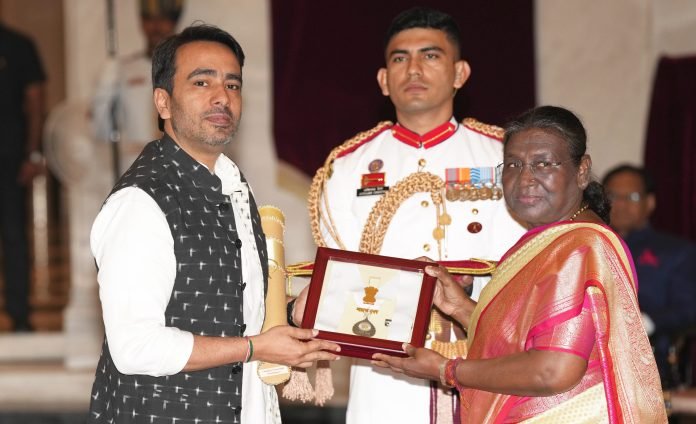Prez Confers Bharat Ratna On Ex-PMs Narasimha Rao, Charan Singh, 2 Others Posthumously
New Delhi, Mar 30: President Droupadi Murmu on Saturday conferred Bharat Ratna, the country’s highest civilian honour, on former prime ministers P V Narasimha Rao and Chaudhary Charan Singh, agriculture scientist M S Swaminathan and two-time former Bihar chief minister Karpoori Thakur, posthumously at a ceremony at the Rashtrapati Bhavan.
The awards to Rao, Singh, Thakur and Swaminathan were received by their kin.
P V Prabhakar Rao, the son of former prime minister Rao, received the award conferred on his father from the president. Jayant Chaudhary, Singh’s grandson and chief of the Rashtriya Lok Dal (RLD), accepted the honour from Murmu.
Swaminathan’s daughter Nitya Rao and Thakur’s son Ram Nath Thakur received the award from the president.
Vice President Jagdeep Dhankhar, Prime Minister Narendra Modi and other dignitaries were present at the ceremony.
This year, the government announced five Bharat Ratna awards, including one to Bharatiya Janata Party (BJP) stalwart and former deputy prime minister L K Advani.
P V Narasimha Rao, who was prime minister from 1991 to 1996 and often referred to as the Chanakya of Indian politics, is known for initiating far-reaching economic reforms and for his skilful political manoeuvring.
He was the first prime minister from the south, the first Congress leader from outside the Nehru-Gandhi family to complete a full five-year term and the man who steered India through the turbulent early 1990s.
Born in an agrarian family in Karimnagar district, now in Telangana, on June 28, 1921, he was educated at the Osmania, Bombay and Nagpur Universities from where he earned his BSc and LLB degrees.
A staunch and trusted loyalist of the Nehru-Gandhi family before, some say, frictions began, Rao had the distinction of holding important non-economic portfolios at the Centre — External Affairs, Defence and Home — at different times in the 1980s. He died on December 23, 2004, at the age of 83.
Chaudhary Charan Singh, a Jat leader from western Uttar Pradesh, was prime minister between July 28, 1979 and January 14, 1980. He died in 1987. Born on December 23, 1902, at Noorpur in Meerut district of Uttar Pradesh in a middle-class family, Singh shifted to Meerut in 1929 and later joined the Congress.
After the Congress split, he became chief minister of Uttar Pradesh for the second time in February 1970 with the support of the Congress. However, the President’s Rule was imposed in the state on October 2, 1970.
Considered the chief architect of land reforms in Uttar Pradesh, Singh had the reputation of being a hard taskmaster who would not tolerate inefficiency, nepotism and corruption in administration. A dedicated public worker and a staunch believer in social justice, his strength stemmed essentially from the confidence he enjoyed among millions of peasants.
The RLD, led by Charan Singh’s grandson Jayant Chaudhary, has recently joined the BJP-led National Democratic Alliance (NDA).
Agricultural scientist M S Swaminathan, who died on September 28, 2023, at the age of 98, is most widely known for transforming India from a drought-stricken country dependent on the United States for foodgrain imports in the 1960s to being declared self-sufficient in food production in 1971.
His efforts involved introducing high-yielding genetic varieties of rice and wheat in India and the subcontinent, alongside American agronomist Norman Borlaug. Swaminathan was awarded the first World Food Prize in 1987 for his work.
Swaminathan’s research as a plant geneticist addressed the issue of food insecurity and helped small farmers augment their income by enhancing productivity. He dedicated his entire life to improving agriculture and the income of farmers.
Fondly addressed as MS by his friends and colleagues, Mankombu Sambasivan Swaminathan, in his long career, demonstrated what he advocated — developing new varieties for food security — and ensured bumper crops by working side by side with farmers.
Born in Kumbakonam in Tamil Nadu on August 7, 1925, to Dr M K Sambasivan and Parvati Thangammai, Swaminathan played a significant role in changing the trajectory of the agriculture sector when farmers were dependent on archaic farming techniques.
A former Rajya Sabha member (2007-13), Swaminathan received 84 honorary doctorate degrees from universities around the world.
Karpoori Thakur, popularly known as ‘jannayak’ (people’s leader), served as Bihar chief minister from December 1970 to June 1971 and from December 1977 to April 1979. He was a key figure in the struggle against social discrimination and inequality.
A fountainhead of OBC politics in Bihar, Thakur was born on January 24, 1924, in one of the most backward sections of society- the Nai Samaj (barber community). His political journey was marked by his unwavering commitment to the marginalised sections of society.
Thakur’s commitment to affirmative action gave representation and opportunities to the poor, oppressed, exploited and deprived sections of the country. His policies and reforms were pioneering in bringing about significant changes in the lives of many, especially in the fields of education, employment and farmer welfare.
His tenure as chief minister is best remembered for the implementation of the Mungeri Lal Commission recommendations, whereby quotas for backward classes were introduced in the state. He died on February 17, 1988. (Agencies)




